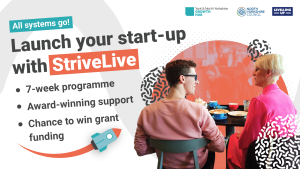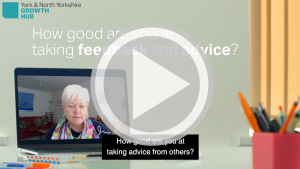
Starting your business
If you are want support with starting your new business, we can help.
Starting your business but need help?
Starting a new business venture is full of rewards but invariably it also comes with risks. It is important to evaluate yourself and what you want from your business, as well as do you research and develop a plan.
Preparing thoroughly will put you in a strong position if you need secure any type of finance for your business and will help you maintain focus. However, it is also crucial to be mentally prepared for thing to go off track at times. Building in a degree of flexibility will enable you can adapt to any changing circumstances.
There is often a large amount effort involved in starting a new business and you will need to wear multiple hats. There will be aspects of setting up that you will be familiar with but some that you will not.

Whether it is as obvious as creating a name for your business or more unclear tasks such as what structure would be right for you, we can help. We provide a range of resources, tools and guides designed to get you underway and save you time.
In addition, we can answer some of the common questions that you may have and point you in the right direction if you need additional support or training. Regardless of the sector that you’re looking to operate in or the size of your ambitions for your new business, we have something for you.

Courses for start-ups
We are working with award-winning partners to deliver a range of online learning with start-up experts.
These events take a very hands-on approach, making it simple and exciting to start a business.
Launch your start-up with the Strive Live Start-Up Incubator

Webinars for start-ups
We have a range of live events designed to support your start-up business.
Alternatively, you can watch one of our recorded webinars on-demand, covering the basics through to growing your business.
Starting a business: Common questions
The first thing to do is to some research and write a business plan. This will help you solidify your idea and understand what you’re offering, how you’ll offer it, and what you need to do to make that happen. It will also give you an idea of your potential competitors, the possible market for your and what you can offer that will make you stand out.
We have a variety of resources to guide you through the initial stages of setting up, these include a Guide to Starting a Business, a free business plan template and a start-up checklist. Just contact us to request any of these and we’ll send them to you.
Most businesses require financial investment at the start to purchase equipment, pay for branding and website design, or to use as working capital. While fledgling businesses are often not eligible for grant support, as they have no track record to prove they’re a secure investment, there are Government-supported loans through programmes like the Start-Up Loan Company.
If you’re considering setting up and want to know more about finance, just get in touch.
Marketing is an important part of any business, and the best place to start is to build a plan of who you’re marketing to, what it might involve and what your competitors are doing.
If you’re targeting the 18-25 market, for instance, you may want to concentrate more on social media channels than print marketing. Work out who your customers are, what you’re offering, and most importantly, why they should buy from you rather than anyone else in a marketing plan. Additionally, it’s worth noting that marketing doesn’t always have to be expensive and there is a wealth of effective but low cost options available.
The easiest way to write a plan is to use a template – contact us to ask for a free copy. You may find you need to adapt parts of it to fit your business model, but it will give you a good starting point.
Setting up your own business can be complex, and having a mentor there to act as a sounding board can be invaluable. The Start-Up Loans Company offers a free dedicated start-up mentor as part of their loans programme, and the Institute of Entrepreneurs runs the Enterprise Mentor Scheme, which helps connect entrepreneurs with experienced business owners.
You could also look for a mentor at a local business network, or even online. The important thing to check is their credentials – are they are who they say they are? – and their reviews, especially if you’re paying for the mentorship. There are lots of professional business coaches who charge for their services, but you might be able to find someone who can help you for free.
Choosing the right business structure is really up to you and depends on how you want to run the business. A sole trader is the easiest form of company to set up and run, but any profit and debts are counted as yours personally. By contrast, a limited company trades as an entity in its own right.
It can all be a little confusing, but contact us if you need further information.
If you have any employees, you will need employers’ liability insurance, which is required by law. It covers your business in case one of your employees becomes ill or injured as a result of working for you.
All other insurance is optional, but it can be a good idea to consider public liability insurance, which covers you against claims from the public. If you offer a professional service, like consultancy, you may want to take out professional indemnity insurance, which protects you from claims made by clients. You can find out more about business insurance here.
It depends on your business structure – if you’re a sole trader, then yes, you do, and you can register with HMRC. However, if you run a limited company, you’re both a director and an employee of your own company, so you don’t need to. Other business structures, such as partnerships, can vary, and it’s always worth checking with HMRC to make sure!
Tax and accountancy can be confusing, and it’s useful to have someone to talk you through it, particularly when you’re starting out and there’s a lot on your plate.
Depending on your business structure, your accountancy obligations could vary, but HMRC should be your first port of call, as they can talk you through everything you need to know.
The Business Advice Service, run by the Institute of Chartered Accountants for England and Wales (ICAEW), offers a free 30-minute appointment with a local accountant to help you go over tax and accountancy and ensure you’re set up and ready to go.
Taking on your first employee is a really exciting step for any business, but it can be tricky to know what to do first! Any kind of business can take on an employee, even if you’re a sole trader, but you do need to register with HMRC as an employer to ensure you’re paying the right tax for any staff. You will also need employers’ liability insurance, to protect yourself and your employee.
In addition, you need to write up a job description and begin advertising! Contact us to get further advice.
“The Growth Hub has really good knowledge of the local area, so they are aware of projects going on that we can link into. For us, going self-employed, it has just been that safety net. I’ve always known I can pick up the phone and speak to the advisor at the Growth Hub.”
Jess Slater, Owner, Whitby Gin
Articles
16 Jan - Strive Live Start-up Incubator (Fully Subscribed)
Looking for start up support in York & North Yorkshire? Join this award-winning programme designed to help entrepreneurs.
Video and downloads: 10 questions to ask when starting a business
Looking to start a business? Watch our video to find out what you should think about and download our handy resource pack that includes planning resources, finance templates and a check list to get you started.
Marketing for start-ups: A beginner’s guide
Marketing for start-ups can leave your head spinning, especially if marketing is new to you. Here’s a quick and easy guide to getting started with marketing for start-ups. How to make a plan when marketing for start-ups The best place to start with your marketing strategy as a start-up business owner is to make a





